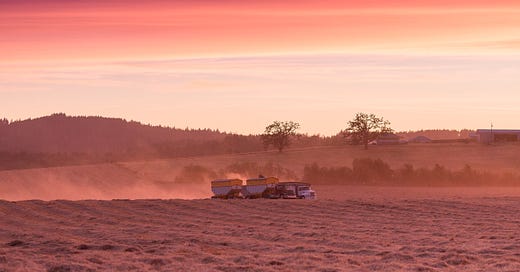What rural Oregonians want: An honest opportunity for input
Rural and urban Oregonians always have had different priorities, but over the past seven years we’ve stopped trusting each other
Division in politics can be ugly. It’s even uglier when the division starts taking hold based on economic and geographical boundaries.
In Oregon, the rural-urban divide could not be more obvious. While the Portland area has held more political power than rural Oregon for decades, the divide still had bridges that allowed at least occasional cooperation until 2015.
What happened in 2015? John Kitzhaber resigned, and Kate Brown became governor.
Since then, rural Oregonians and rural business owners have seen minimum wages and taxes increase, top-down environmental regulations multiply, and agencies increasingly work against them instead of for them. It's not that Governor Kitzhaber was a stellar governor; he had his own issues, but he also threw rural Oregon a bone occasionally. A former resident of Roseburg, he recognized the diverse economy and cultures of this state. His values didn’t necessarily match mine or many of my colleagues who earn their living in rural Oregon, but he also knew throwing down the gauntlet would not do Oregon any favors. More importantly, he recognized the importance of trust.
In contrast, highly partisan agendas have driven the Legislature and the governor in the last seven years. Rural Oregonians showed up in force in 2019 and 2020 to stop proposed cap-and-trade legislation that would have done nothing to curb emissions while imposing more taxes and higher energy prices. Democrat leaders simply said, well move to the city and get a green job. Thanks to Timber Unity and Republican legislators who walked out, that legislation was killed.
A few of us rural Oregonians met with Governor Kate Brown during the 2020 Timber Unity rally against cap and trade. However, our voices did not matter. She still took executive action to implement cap and trade.
As governor, you are supposed to be the leader and make all Oregonians feel valued, but time and time again rural Oregon’s needs are ignored. This has eroded trust in our leaders. It’s even motivated some counties to want to secede from Oregon to become part of Idaho.
The anger I feel, and many rural Oregonians feel is not wrong. Portland politicians are controlling the agenda and pushing their ideologies in geographies where they simply don’t work. What Oregon needs is balance.
How do we get balance?
Redistricting made it even more challenging for Republicans to gain a majority in the Oregon Legislature. The senate provides a better opportunity for balance than the house; however, the real opportunity lies in the race for governor.
History tells us a story of scenarios like the current one we have now, when Oregon voters are dissatisfied with the status quo. Each time the Republican falls shorts by a couple of points. The last race such was 2010 Chris Dudley vs John Kitzhaber. This year provides a twist with a well-funded third-party option in Senator Betsy Johnson.
Many polls show that there is no way an “independent” candidate can win. However, as a longtime Democrat who supports abortion and more taxes than any Republican would accept, Senator Betsy Johnson will most likely take away more votes from Democratic nominee Tina Kotek than Republican nominee Christine Drazan. This gives a real chance for a Republican governor to be elected. Just the presence of a financially viable independent candidate will change the dynamics of the campaign, hopefully bringing more attention to rural issues.
While I think a Republican governor would be more likely to solve Oregon’s most pressing problems, I recognize that this is a democracy, and my candidate won’t always win. What I – and other rural Oregonians – really want is for our legislators to critically think whether they are helping all of Oregon, not just the urban areas.
If urban and rural voters want to understand each other better, to feel validated and heard, we need a blue and red government. We need a Legislature without a super majority on either side and a governor who will be the stop point for bad legislation and appoint agency heads who are capable of leading and working for all the people. Division is exhausting and brews anger. No matter who wins the election, let’s listen to everyone, stop being angry and get to work.
Marie Bowers is a seventh-generation Oregonian and a fifth-generation farmer. She farms with her family in the South Willamette Valley and lives on the farm with her 3-year-old son.






Governor Kitzhaber in his first two terms was a great Governor who listened and acted on rural issues. Governor Brown a disgusting failure who agrees with everything Portland liberals want to force on the state. And you are correct we need a more balanced legislature.
Marie, what concrete examples are you providing to assist rural Oregonians? Your OPED just complained and didn't provide solutions, other than to listen to each other.